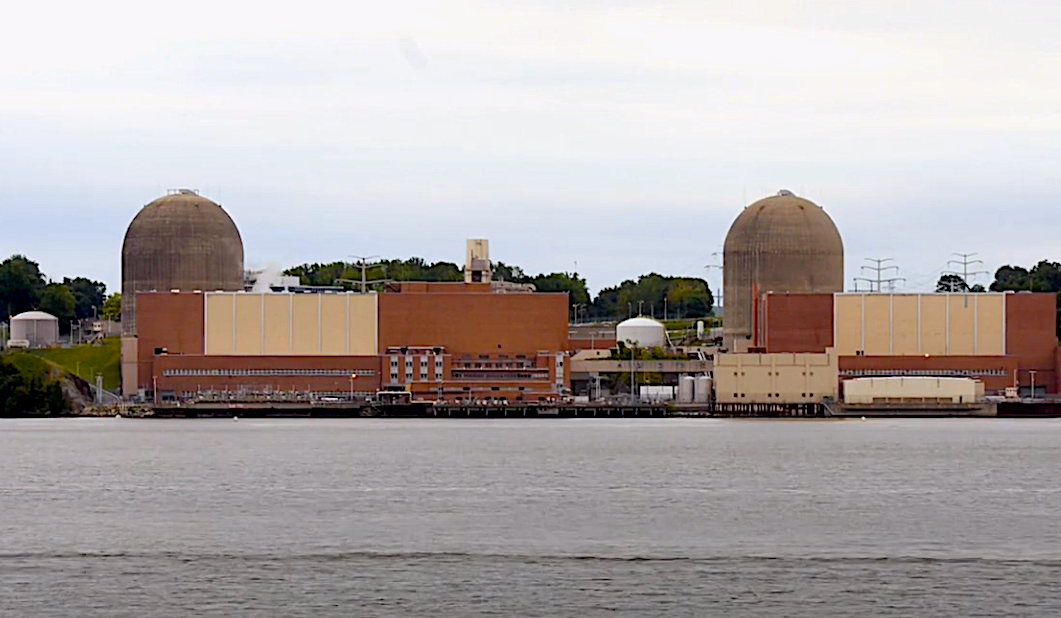Holtec, the company that is decommissioning the Indian Point nuclear power facility, through the entities Holtec International, Holtec Indian Point 2 LLC, Holtec Indian Point 3 and Holtec Decommissioning International LLC, is suing New York state for what it calls the state’s “blatant infringement on the federal government’s exclusive right to regulate the discharge of radioactive materials from nuclear power plants.” The lawsuit was filed in United States District Court for the Southern District of New York.
Holtec had wanted to dispose of radioactive wastewater from Indian Point in the Hudson River but has been blocked by a recently-enacted New York state law that prohibits such discharges. Holtec says that the Atomic Energy Act of 1954 grants the federal government the exclusive responsibility for regulating radioactive discharges from nuclear plants.

Holtec claims that the New York state law “infringes on the exclusive authority of the federal government and the Nuclear Regulatory Commission … under the Atomic Energy Act.” It says that the state law “is federally preempted and must be set aside.” Holtec charges that in enacting the new law, New York state “attempted to hide its efforts to regulate radiological health and safety under the guise of economic concerns. This false pretense does not change the fact that the state is attempting to regulate matters with a direct effect on radiological safety.”
There was an outcry when it became known that Holtec was planning to dump radioactive wastewater into the Hudson. At the time, Holtec explained that the radioactive contamination was extremely diluted and the wastewater was safe. Government leaders such as Westchester County Executive George Latimer, Rockland County Executive Ed Day and Gov. Kathy Hochul joined with community and environmental groups in protesting the plan.
In its lawsuit, Holtec explained, “On November 23, 2020, Holtec received approval from the NRC (Nuclear Regulatory Commission) to assume ownership and operation of Indian Point, including responsibility for decommissioning.”
Holtec continued, “Decommissioning Indian Point necessarily involves disposing of the plant structures themselves and the water remaining from power plant operations and spent nuclear fuel pool storage. That water is radioactive from the operation of the power plants and the storage of spent nuclear fuel. The water will be treated to remove radioactive materials but will still include tritium, a radioactive isotope of hydrogen, which cannot be removed.
“Tritiated water is regularly released by operating reactors and has been released on numerous occasions from Indian Point in accordance with NRC regulations. Holtec’s plan to treat and dispose of the tritiated wastewater in the Hudson River from Indian Point fully satisfies NRC regulations and is well within federal limits on radiological discharges.”
Holtec asks for the court to rule that the law that stops it from its planned disposal of radioactive water that was signed by Gov. Hochul on August 18, 2023, is unconstitutional pursuant to the Supremacy Clause of the Constitution and other federal law. It asks for the court to award it the costs of the litigation and any other relief as the court may deem just and proper. The attorneys filing the lawsuit were Jay Silberg and Anne Leidich of the law firm Pillsbury Winthrop Shaw Littman LLP.
Tracy Brown, president of Riverkeeper, one of the groups that opposed Holtec’s wastewater plan, reacted to the lawsuit by saying, “Federal law allows for states to regulate their own interests, including economic interests. The Save the Hudson legislation is not only an appropriate use of state power, it is necessary to protect New York from the economic damages that would come from using the Hudson River as a dumping ground. Riverkeeper continues to advocate for storing the radioactive wastewater on site for at least twelve years, which is one half-life of tritium, while reasonable and advantageous disposal methods can be determined.”




















